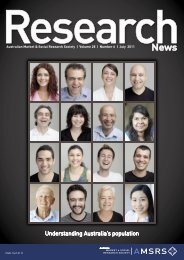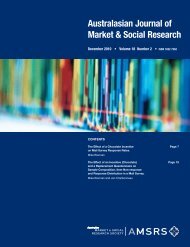Asia Pacific region - aprc-research
Asia Pacific region - aprc-research
Asia Pacific region - aprc-research
You also want an ePaper? Increase the reach of your titles
YUMPU automatically turns print PDFs into web optimized ePapers that Google loves.
Dominic Carter Bob Chua James Fergusson<br />
The mobile only revolution<br />
Percentage of mobile internet browsers who ‘never or infrequently use the<br />
desktop internet’ *<br />
Country<br />
India, China, Indonesia, Thailand 43%<br />
South Africa, Egypt, Ghana, Nigeria, Kenya 56%<br />
US, UK 22%<br />
Russia 19%<br />
US 22%<br />
UK 25%<br />
China 30%<br />
Thailand 32%<br />
Indonesia 44%<br />
Nigeria 50%<br />
Kenya 54%<br />
Ghana 55%<br />
South Africa 57%<br />
India 59%<br />
Egypt 70%<br />
% of mobile only<br />
Data gathered from July to November 2010 - N= 15,204 (Source: On Device Research)<br />
* ‘Infrequent’ mobile internet browsers use it once a month or less<br />
Fergusson and Williams say most rural and remote <strong>region</strong>s<br />
in the developing world still lack basic internet infrastructure<br />
and access. Increasingly mobile networks are penetrating deep<br />
into these formerly inaccessible <strong>region</strong>s including in difficult and<br />
complex countries. With dropping data rates, mobile internet has<br />
begun to rapidly penetrate all geographies. In Rural China, one in<br />
four internet users are introduced to the web for the first time via<br />
their mobile phone.<br />
At APAC, Fergusson and Williams will argue that these factors<br />
alone provide compelling evidence that the <strong>Asia</strong> market <strong>research</strong><br />
industries must focus a greater investment emphasis on fast tracking<br />
the use of mobile phones to be a viable and commonly accepted<br />
data collection medium.<br />
‘In a global context this is far more important to our industry than<br />
the online revolution was in the early 2000s,’ they say.<br />
According to ESOMAR’s latest Global Market Research Report,<br />
Japan is the biggest <strong>research</strong> market by turnover in the <strong>Asia</strong> <strong>Pacific</strong><br />
<strong>region</strong> – yet to be trumped by China, where the industry has only<br />
operated for about 23 years – and the Japanese <strong>research</strong> industry<br />
is also being radically transformed by technology.<br />
Dominic Carter, who founded Carter Associates KK in 2004 a few<br />
years after emigrating from Australia to Japan to work for Millward<br />
Brown, says his business was not that badly affected by the GFC because<br />
he had ongoing contracts focused on the domestic market.<br />
But he says that despite his company’s apparent immunity from<br />
the GFC, many market <strong>research</strong> companies are doing it tough. Carter<br />
says there has been considerable consolidation among foreign<br />
suppliers in Japan and now most of the major foreign players are<br />
owned by the WPP Group and are operating (or soon will be) under<br />
one brand, Japan Kantar Research.<br />
‘It has proven difficult for the multinational <strong>research</strong> agencies to<br />
develop their branded product solutions in the Japanese market on<br />
a scale that justifies their independent existence.<br />
‘The rest of the industry in Japan is under pretty severe pressure,<br />
especially when it competes with online panels. A lot of the work in<br />
the past few years has gone to the relatively new companies Yahoo<br />
Value Insights and Macromill, which have now merged,’ he explains.<br />
‘The industry, which has never been much of a value-added insightsdriven<br />
industry, has really been changed by the move towards online<br />
panels. Technology is driving everything towards being quicker, faster<br />
and cheaper. Clients are cutting budgets to the bone.’<br />
Online shopping company Rakuten has even moved into the<br />
consumer <strong>research</strong> space. It operates a <strong>research</strong> panel and has<br />
launched a do-it-yourself survey solution.<br />
Carter says while there are some Western-style <strong>research</strong> users<br />
in Japan who demand quality insight generation from their agencies,<br />
they are the exception rather than the rule. Japanese clients<br />
are less likely to make decisions based on <strong>research</strong> than their<br />
Western counterparts.<br />
‘Domestic companies tend not to do as much MR as we know it,’<br />
he explains. ‘As a percentage of GDP, spend on MR is much lower<br />
than it is in other markets. Japanese clients have never really demanded<br />
much by way of insights from their suppliers, so this very<br />
utilitarian, quick, cheap solution [offered by online panels] really<br />
serves the market well.’<br />
Carter believes the days of <strong>research</strong> ‘as we know it’ are numbered<br />
(and not just in Japan) and that <strong>research</strong>ers, in the quantitative area<br />
at least, need to get much more au fait with technology and better understand<br />
what advances in mobile internet mean for market <strong>research</strong>.<br />
This is one of the reasons he has recently launched a new Japanese<br />
joint venture with Australian market <strong>research</strong> technology company<br />
Potentiate (formed recently by the consolidation of software firm Infotools<br />
Australia, panel management and survey deployment specialist<br />
Plenari and online sample firm Sampleworx under one brand).<br />
‘The way we do <strong>research</strong> is going to change. Japanese don’t have<br />
any preconceived notions that you shouldn’t exploit technology. There<br />
are also newer players who don’t necessarily make the distinction<br />
between other branches of marketing and <strong>research</strong>. Potentiate is<br />
very, very appropriate to the times when everything becomes much<br />
more technology driven. We have developed and are developing<br />
products that are very empowering for the client, allowing them to<br />
achieve a lot more in the areas of <strong>research</strong> data collection, analysis<br />
and communication, a lot more quickly.’<br />
‘CATI versus online panels shouldn’t even be a conversation,’ argues<br />
Fergusson. ‘We’re caught up in a debate that’s 10 years old.’<br />
Reassuringly, he believes there are real opportunities for Australian<br />
<strong>research</strong>ers to lead the mobile <strong>research</strong> revolution. These<br />
will no doubt be explored further at APAC 2011.<br />
Kerry Sunderland, managing editor, Research News<br />
Research News March 2011 15





